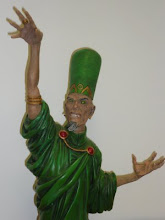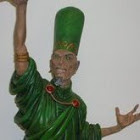
I did not catch this comic at all, there is nothing astray with the production, the writing or the art, it simply did not grip me as a reader. The basic premise of the stories is an interesting one, the architect of a Utopian city returns to try and undo the changes made to his work that have created a cityscape that drive the inhabitants mad. This is a sharp concept with huge room for interesting and varied stories and the ambition of the idea does not quite make it through to the execution. The stories are solid and the plots and reveals are well constructed, they are just smaller that the concept calls out for. The focus is on too small group when it should be on the great panorama of the city and the extraordinary interactions possible between its inhabitants and their urban context. The stories shrink rather than expand.
The book is very stylish, Dean Motter is a graphic designer and the book shows the strong influence of design ideas, the images of the cityscape seem to come from Metropolis and have lovely sweeps of Art Deco, the cast step out of the world of film noir with updated 1940's clothing and styles. The mix is interesting and the various artists who worked on the stories respond with great expression and energy.
There is not a believable emotional core to the book that can reach out to the reader and draw them into Radiant City and have them join the cast, it always remains a spectacle at one remove. In the film noir stories there was a centre of sweaty desperation that drew in the viewer, that made you hope for a better ending than you know will arrive. This comic has captured the clothes but not the heart of those stories and looses the true spirit it was hoping to evoke. There were a million stories in the Naked City there too few in Radiant City.


No comments:
Post a Comment